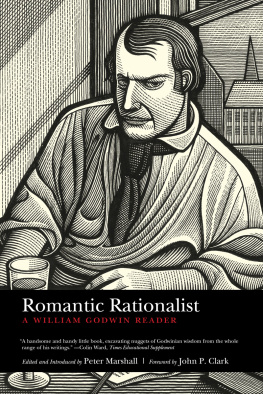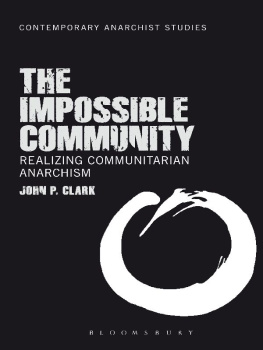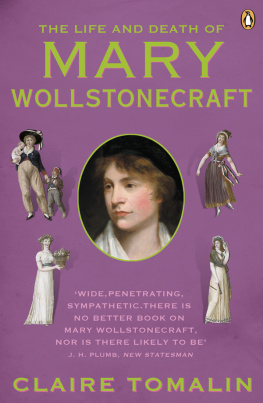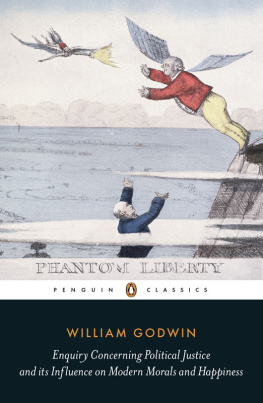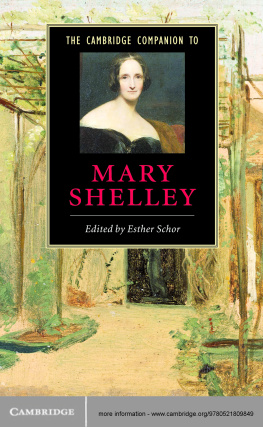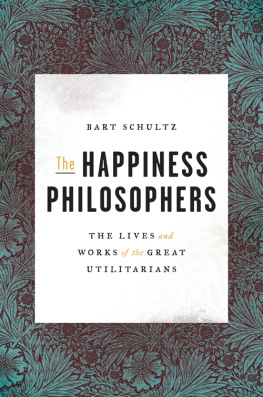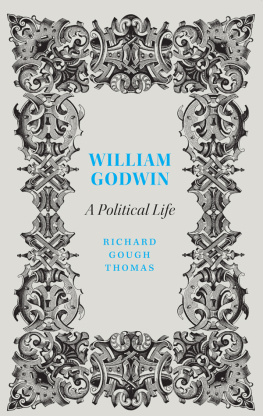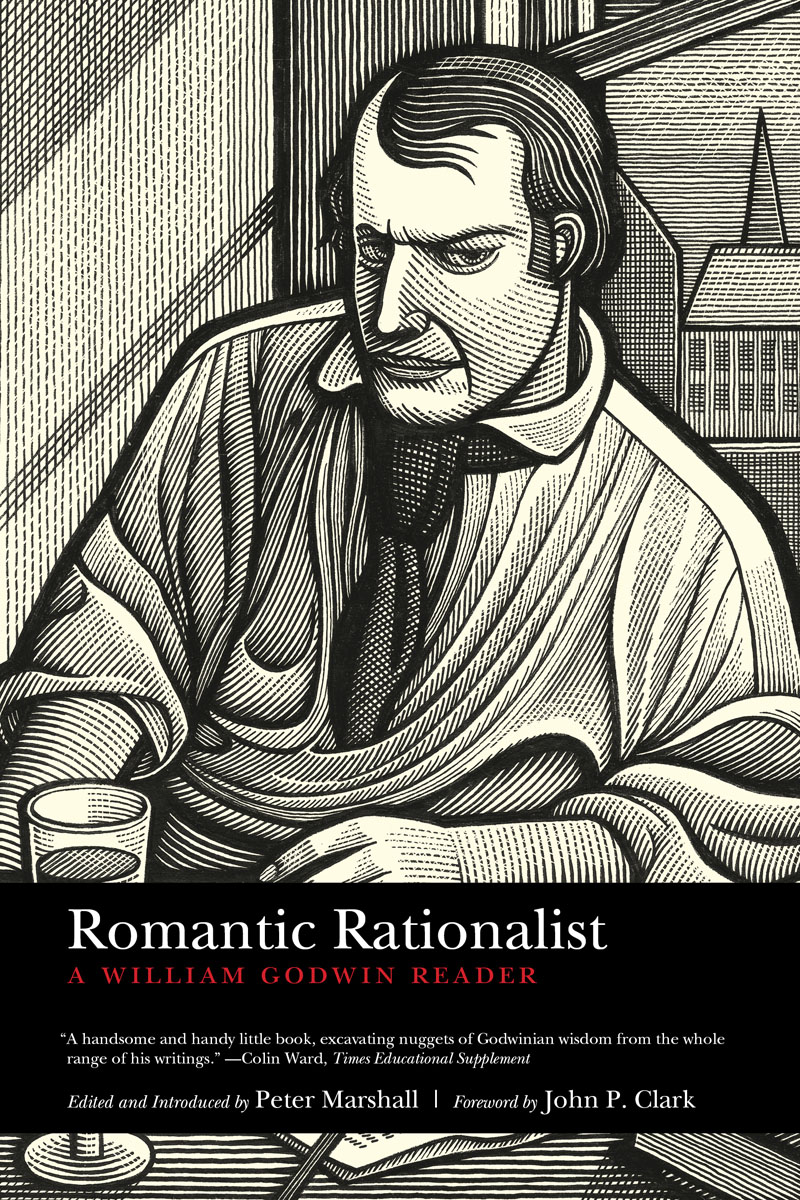
PRAISE
Peter Marshall has produced the most useful modern account of Godwins life and now the most useful modern anthology of his writings. Marshalls selection is sensible and valuable, bringing out the important points. His introduction is a good summary of Godwins life and work Marshall is right to see him as the most profound exponent of philosophical anarchism.
Nicolas Walter, New Statesman
A handsome and handy little book with a 46-page introductory essay, excavating nuggets of Godwinian wisdom from the whole range of his writings.
Colin Ward, Times Educational Supplement
An anarchist classic with a valuable sketch of Godwins life and an interpretation of his work. Much of what Godwin says is obvious common sense.
Henry Geiger, MANAS Journal

William Godwin by Sir Thomas Lawrence, 1795, engraved by W. Ridley
Romantic Rationalist: A William Godwin Reader
Copyright 2017 Peter Marshall
First published by FREEDOM PRESS, London, in 1986, reprinted 1996
Reprinted with new foreword and corrections
All rights reserved. No part of this book may be transmitted by any means without permission in writing from the publisher.
ISBN: 9781629632285
Library of Congress Control Number: 2016948154
Cover portrait by Clifford Harper
Cover by John Yates / www.stealworks.com
Interior design by briandesign
10 9 8 7 6 5 4 3 2 1
PM Press
PO Box 23912
Oakland, CA 94623
www.pmpress.org
Printed in the USA by the Employee Owners of Thomson-Shore in Dexter, Michigan.
www.thomsonshore.com
For Jonathan Peter, Maria Charlotte, Rose and Theodore
CONTENTS
ACKNOWLEDGEMENTS
I am indebted to Jenny Zobel for reading the introduction. I would also like to express my thanks to Vernon Richards and the Freedom Press Group for enabling this volume to be first published. It is particularly appropriate that it should appear a century and a half after the death of Godwin, and a century after Kropotkin, the first militant anarchist to recognize Godwins importance, joined the Freedom Press Group.
Gwynedd, Wales, 1 June 1985
For this third edition, I would like to thank warmly John P. Clark for writing a new foreword. I consider his book The Philosophical Anarchism of William Godwin to be the best on Godwins moral and political philosophy. Ramsey Kanaan and Craig OHara of PM Press have wisely published this corrected edition. Elizabeth Ashton Hill has carefully read the text again. Mo Moseley kindly scanned the second edition of the Freedom Press book The Anarchist Writings of William Godwin and moved the footnotes to the bottom of each page. Laura March has proofread them. Many thanks also to Clifford Harper for his excellent portrait of William Godwin which has been used on the front cover.
Devon, England, Summer Solstice, 2016
EDITORS NOTE
This work is intended to provide a handy collection of William Godwins most incisive and relevant thoughts, together with an assessment of his influence, a biographical sketch and an analysis of his contribution to anarchist theory and practice. It is usual to consider Godwin only as the author of the philosophical treatise Enquiry concerning Political Justice (1793) and the novel Caleb Williams (1794) but he was a prolific writer and published more than fifty works. Many of these works are still worth reading and I have therefore selected passages from a wide range. While his style is clear and eloquent, it can be a little ponderous at times and he did not always know when to stop. The present arrangement is therefore generally more consistent than in the originals. The selections are not intended however as a substitute but as an arrow to the works themselves. Although in the linguistic habit of his day, Godwin speaks of man, he uses the term to refer to the whole human species, regardless of race or sex.
My own interest in Godwin began in 1971 when I discovered in a dusty second-hand bookshop in the Lanes in Brighton a copy of George Woodcocks biographical study William Godwin (1946). It had printed on the inside page: Lourdes Convent, Withdean, Brighton. What terror the good nuns must have felt to have found in their midst the presence of an anarchist, an atheist and an advocate of free love!
In recent years new hardback and paperback editions of Political Justice and several full-length studies of Godwin have revived his reputation, but he still remains largely the property of intellectuals and within the confines of academe. Without trivializing the analysis, it is hoped that the present volume will enable Godwins thought to ferment anew in the libertarian movement.
The text has been corrected throughout and the bibliography brought up to date. Godwins reputation has rightly increased since the anthology was first published thirty years ago and he deserves to be celebrated as an important philosopher and novelist and his work widely discussed.
Abbreviations of Works by William Godwin
A.S., An Account of the Seminary (1783)
Considerations, Considerations on Lord Grenvilles and Mr. Pitts Bills (1794)
P.J., Enquiry concerning Political Justice (1793; 2nd ed., 1796; 3rd ed., 1798)
Thoughts, Thoughts Occasioned by the Perusal of Dr. Parrs Spital Sermon (1801)
T.M., Thoughts on Man (1831)
FOREWORD
There is no better way to get a concise but comprehensive introduction to Godwins political philosophy than to read Romantic Rationalist: A William Godwin Reader. The editor, Peter Marshall, has an exhaustive knowledge of Godwin and his works, and it is exhibited well in this collection. Marshall says that the book is intended to provide a handy collection of William Godwins most incisive and relevant thoughts, together with an assessment of his influence, a biographical sketch, and an analysis of his contribution to anarchist theory and practice. Through its excellent introduction to Godwins life and thought, and through the aptly chosen selections from his works, it does all of these things and more. Marshall has, by means of this book, along with his Godwin study and his history of anarchism, made a powerful contribution to demonstrating Godwins rightful place as a major figure in the history of modern political thought.
Godwins influence on the anarchist tradition is comparable in some way to that of figures like Spinoza or Kant on mainstream Western political thought. These thinkers are important not so much for their direct relation to historical movements and popular ideologies closely related to them, but for their great theoretical contributions to their political traditions. Similarly, Godwin never had a major impact on the historical anarchist movement; but nevertheless, he is theoretically important and certainly deserves careful attention from anyone interested in libertarian political theory. Indeed, he deserves attention from anyone interested in political theory of any kind. For perhaps the most important thing that this book achieves is to show that if Godwin is evaluated on his own merits he is the theoretical equal of figures such as Machiavelli, Hobbes, Locke, Rousseau and Mill. He deserves to be classed among the greats of modern political thought.
Marshall has chosen the selections very capably, and they exhibit admirably what is most important in Godwins thought. Marshall also contributes an excellent introduction to Godwins life and the most significant aspects of his thought. In this brief preface, I would like to supplement his efforts with a brief assessment of Godwins greatest contributions to modern political theory (the case for him to be included among the greats) and also to point out some of the most problematic aspect of his thought. In doing this I also pose the question: If the project of a philosophical anarchism is a valid one, where might it find inspiration and guidance in Godwins work, and where might it better look elsewhere?
Next page
